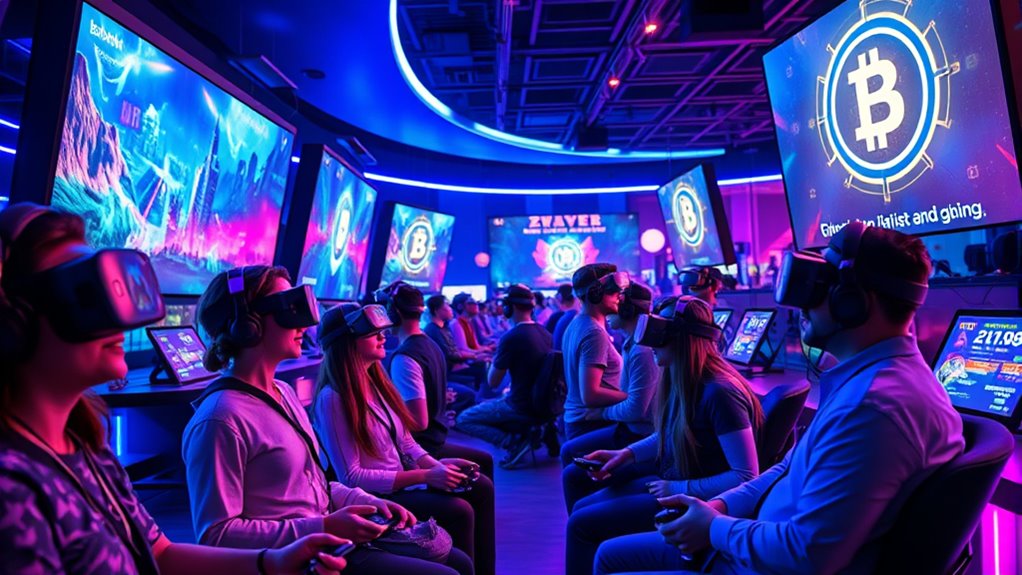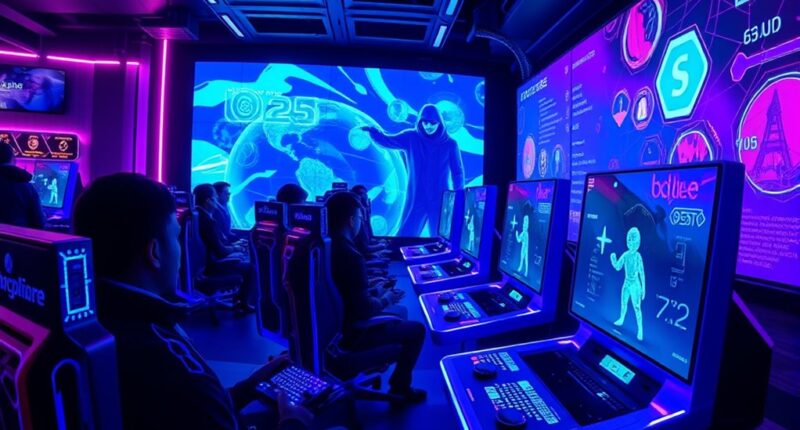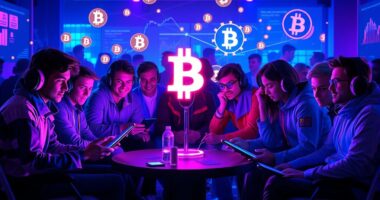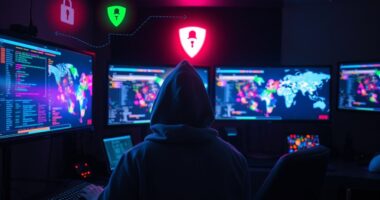By 2025, top blockchain games will seamlessly integrate NFTs into gameplay, giving you true ownership of digital assets like characters and land on secure blockchain platforms. These games will feature decentralized economies, enabling you to trade, stake, and earn rewards through play. With player governance shaping updates and rules, you’ll have a real say in the game’s future. Stay tuned, as there’s more to uncover about this revolutionary era of gaming and earning opportunities.
Key Takeaways
- Seamless integration of NFTs enables players to own, trade, and monetize unique digital assets across games and platforms.
- Decentralized economies empower players to influence market dynamics and asset values through open marketplaces.
- Play-to-earn models reward players with tokens and assets, creating sustainable earning and investment opportunities.
- Community-driven governance allows players to participate in decision-making and game evolution transparently.
- Enhanced security and ownership rights protect digital assets, fostering trust and fair play in blockchain gaming ecosystems.

By 2025, blockchain games will have transformed the way you play, trade, and own digital assets. You’ll find yourself immersed in worlds where NFTs are seamlessly integrated into gameplay, making every item, character, or land piece unique and truly yours. This isn’t just about collecting digital items; it’s about owning a piece of the game itself. NFT integration means that your assets are stored securely on the blockchain, giving you full control and the ability to trade or sell them outside the game environment. This creates a new level of value, where your in-game achievements have real-world worth, and scarcity becomes a key factor in asset desirability. You’ll notice that decentralized economies are the backbone of these games, removing traditional centralized control and allowing players to participate directly in the economic system. Instead of developers dictating prices or controlling supply, the community drives the economy through open marketplaces and transparent mechanisms. This decentralization fosters trust and encourages active participation, as your actions can influence the overall game economy. You might find yourself earning tokens or assets through gameplay, which you can then trade or stake for additional rewards, creating an ongoing cycle of earning and investing. The decentralization also means that game updates, governance, and rule changes are often driven by player consensus, giving you a voice in how the game evolves. You’ll see game developers shifting from traditional publishers to platforms that empower players to shape the future of the game. The integration of NFTs further supports this dynamic, as players can create, buy, or sell customized content, fostering a vibrant marketplace within the game. This ecosystem encourages innovation, with artists and developers collaborating to craft unique assets that hold value both inside and outside the game. The decentralized economy also mitigates issues like inflation or unfair practices since supply and demand are managed transparently on the blockchain. Additionally, understanding narcissism can help players recognize manipulative tactics used by some game creators to influence in-game economies. As a player, you’ll appreciate the increased security and ownership rights, knowing that your digital assets are protected from censorship or arbitrary deletion. Overall, by 2025, these advanced blockchain games will redefine what it means to play, trade, and own in the digital sphere, putting you at the center of a thriving, player-driven economy where your participation truly counts.
Frequently Asked Questions
How Secure Are Blockchain Game Assets From Hacking?
Blockchain game assets are generally secure, but smart contract vulnerabilities can pose risks if not properly audited. You should also be aware of decentralization challenges that might make certain platforms more vulnerable to hacking attempts. To protect your assets, choose games with strong security measures, regularly update your wallets, and stay informed about potential smart contract bugs. This way, you can enjoy play-to-earn gaming while minimizing risks.
Will Play-To-Earn Games Replace Traditional Gaming Completely?
Imagine a world where pixels and profits collide—play-to-earn games might not fully replace traditional gaming, but they’ll certainly give game design a radical makeover. You’ll find yourself more engaged, chasing rewards instead of storylines, while developers tailor experiences to maximize player engagement. Still, classic games will persist, serving those who crave story over crypto. So, don’t worry; the gaming universe will expand, not vanish.
What Are the Environmental Impacts of Blockchain Gaming?
You should know that blockchain gaming’s environmental impacts mainly involve high energy consumption, which increases carbon footprints. Additionally, e-waste generation from outdated hardware used to mine or run blockchain applications contributes to environmental strain. While these issues are significant, many developers are working on eco-friendly solutions like energy-efficient protocols, so you can support greener blockchain games to reduce your environmental impact.
Can Players Truly Own and Transfer Assets Across Different Games?
You might wonder if you can truly own and transfer assets across different games; the answer is yes, but not without challenges. Interoperability issues and cross-platform compatibility still pose hurdles, making seamless transfer tricky. As technology advances, expect more fluidity, but for now, you may encounter limitations. This evolving landscape hints at a future where your digital assets could travel freely, revealing new possibilities in blockchain gaming.
How Accessible Are Blockchain Games for Non-Cryptocurrency Users?
Blockchain games are becoming more accessible for non-cryptocurrency users thanks to improved user interfaces that simplify complex processes. You can easily navigate the in-game economy without needing deep crypto knowledge, as platforms now integrate seamless wallets and straightforward transactions. Developers focus on making onboarding smooth, so you can enjoy blockchain gaming without feeling overwhelmed. This shift helps more players participate in the evolving digital economy, expanding the community beyond crypto enthusiasts.
Conclusion
As you step into this new era, imagine yourself maneuvering a vibrant digital universe, where each game is a shimmering island waiting to be explored. Blockchain transforms your journey into a treasure map, guiding you through adventures filled with rewards and discovery. Embrace the play-to-earn revolution, and let your quest unfold in a world where your skills and investments grow side by side, turning every moment into a legendary chapter of your gaming saga.









